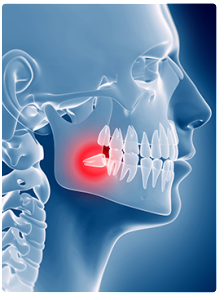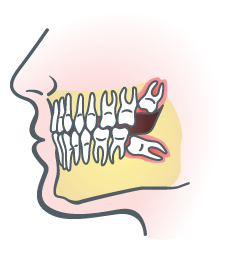Sometimes the after-effects of oral surgery are quite minimal, so not all of the instructions may apply. Common sense will often dictate what you should do. However, if you have a question, follow these guidelines or call our office for clarification. Our number is: 626-304-3004.
DAY OF SURGERY
FIRST HOUR: Bite down gently but firmly on the gauze packs that have been placed over the surgical areas, making sure they remain in place. Do not change them for the first hour unless the bleeding is not controlled. The packs may be gently removed after one hour. If active bleeding persists, place enough new gauze to obtain pressure over the surgical site for another 30 minutes. The gauze may then be changed as necessary (typically every 30 to 45 minutes). It is best to moisten the gauze with tap water and loosely fluff for more comfortable positioning.
EXERCISE CARE: Do not disturb the surgical area today. Do NOT rinse vigorously or probe the area with any objects. You may brush your teeth gently. PLEASE DO NOT SMOKE for at least 48 hours, since this is very detrimental to healing and may cause a dry socket.
OOZING: Intermittent bleeding or oozing overnight is normal. Bleeding may be controlled by placing fresh gauze over the areas and biting on the gauze for 30-45 minutes at a time.
PERSISTENT BLEEDING: Bleeding should never be severe. If so, it usually means that the packs are being clenched between teeth only and are not exerting pressure on the surgical areas. Try repositioning the packs. If bleeding persists or becomes heavy, you may substitute a tea bag (soaked in very hot water, squeezed damp-dry and wrapped in a moist gauze) for 20 or 30 minutes. If bleeding remains uncontrolled, please call our office.
SWELLING: Swelling is often associated with oral surgery. It can be minimized by using a cold pack, ice bag or a bag of frozen vegetables (such as peas) wrapped in a towel and applied firmly to the cheek adjacent to the surgical area. This should be applied twenty minutes on and twenty minutes off during the first 24 hours after surgery. If you have been prescribed medicine for the control of swelling, be sure to take it as directed.
PAIN: Unfortunately most oral surgery is accompanied by some degree of discomfort. You will usually have a prescription for pain medication. If you take the first pill before the anesthetic has worn off, you should be able to manage any discomfort better. Some patients find that stronger pain medicine causes nausea, but if you precede each pain pill with a small amount of food, it will reduce the chance that nausea will occur. The effects of pain medications vary widely among individuals. If you do not achieve adequate relief at first, you may supplement each pain pill with an analgesic such as aspirin or ibuprofen. Some patients may even require two of the pain pills at one time. Remember that the most severe pain is usually within six hours after the local anesthetic wears off; after that your need for medicine should lessen. If you find you are taking large amounts of pain medicine at frequent intervals, please call our office. If you anticipate needing more prescription medication for the weekend, you must call for a refill during weekday business hours.
NAUSEA: Nausea is not uncommon after surgery. Sometimes pain medications are the cause. Nausea can be reduced by preceding each pain pill with a small amount of soft food, and taking the pill with a large volume of water. Try to keep taking clear fluids and minimize dosing of pain medications, but call us if you do not feel better. Classic Coca Cola may help with nausea.
DIET: Eat any nourishing food that can be eaten with comfort. Avoid extremely hot foods. Do not use a straw for the first few days after surgery. It is sometimes advisable, but not absolutely required, to confine the first day’s intake to liquids or pureed foods (soups, puddings, yogurt, milk shakes, etc.). It is best to avoid foods like nuts, sunflower seeds, popcorn, etc., which may get lodged in the socket areas. Over the next several days you may gradually progress to solid foods. It is important not to skip meals! If you take nourishment regularly you will feel better, gain strength, have less discomfort and heal faster. If you are a diabetic, maintain your normal eating habits or follow instructions given by your doctor.
SHARP EDGES: If you feel something hard or sharp edges in the surgical areas, it is likely you are feeling the bony walls which once supported the extracted teeth. Occasionally, small slivers of bone may work themselves out during the following week or so. If they cause concern or discomfort, please call the office.
INSTRUCTIONS FOR THE SECOND AND THIRD DAYS
MOUTH RINSES: Keeping your mouth clean after surgery is essential. Use ¼ teaspoon of salt dissolved in an 8 ounce glass of warm water and gently rinse with portions of the solution, taking five minutes to use the entire glassful. Repeat as often as you like, but at least two or three times daily.
BRUSHING: Begin your normal oral hygiene routine as soon as possible after surgery. Soreness and swelling may not permit vigorous brushing, but please make every effort to clean your teeth within the bounds of comfort.
HOT APPLICATIONS: You may apply warm compresses to the skin over the areas of swelling (hot water bottle, hot moist towels, heating pad) for 20 minutes on and 20 minutes off to help soothe tender areas. This will also help decrease swelling and stiffness.
HEALING: Normal healing after tooth extraction should be as follows: The first two days after surgery are generally the most uncomfortable and there is usually some swelling. On the third day you should be more comfortable and, although still swollen, can usually begin a more substantial diet. The remainder of the post-operative course should be gradual, steady improvement. If you don’t see continued improvement, please call our office. If you are given a plastic irrigating syringe, DO NOT use it for the first five days. Then use it daily according to the instructions until you are certain the tooth socket has closed completely and that there is no chance of any food particles lodging in the socket.
It is our desire that your recovery be as smooth and pleasant as possible. Following these instructions will assist you, but if you have questions about your progress, please call the office where you had surgery. A 24-hour answering service is available to contact the doctor on call after hours. Calling during office hours will afford a faster response to your question or concern.
PLEASE NOTE: telephone calls for narcotic (pain killer) prescription renewal are ONLY accepted during office hours.
VIEW PRINTABLE HOME INSTRUCTIONS
 For many people, the best treatment for wisdom teeth is to remove them. This treatment helps prevent future dental problems and maintain a healthy mouth and smile.
For many people, the best treatment for wisdom teeth is to remove them. This treatment helps prevent future dental problems and maintain a healthy mouth and smile. Alternatives to Extracting Wisdom Teeth
Alternatives to Extracting Wisdom Teeth